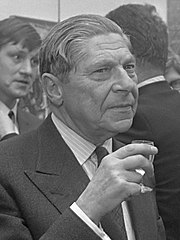
One of science fiction's greats passed away late last month.
I refer of course to Harlan Ellison, the author of Web of the City (1958), Spider Kiss (1961), and A Boy and His Dog (1969). But Ellison worked best in forms that were not book length. Among his many published collections of short stories, Stalking the Nightmare (1982), Angry Candy (1988) and Mind Fields (1994). No, that isn't a photo of Ellison I've attached here. I'll tell you who the b-and-w photo is of in due course.
Ellison was probably best known, though, for having written the screenplay for the greatest episode of the original Star Trek, "City on the Edge of Forever."
Or, rather, he wrote the first draft of the screenplay. My understanding is that Roddenberry re-wrote it quite radically, in ways to which Ellison was never reconciled.
Well, that's show biz. The basic plot involves a time machine that sends Captain Kirk back to the year 1930, a soup kitchen in Depression-stricken America, and to the hours before a life-or-death fork in history involving a woman living in that era who in early versions was known as Edith Koestler, but who in later versions (and the final shooting) was Edith Keeler. Keeler's life or death is bound up with whether Kirk, Spock, and McCoy will ever make it back to their own time and their ship, and indeed to whether the time line post-depression as the history books know it, the timeline that made The Enterprise possible, is going to unfold.
Edith Keeler was played by Joan Collins.
One final note: her original surname. Really Harlan? Your idea was to name her Koestler? To a man with Ellison's erudition that could not NOT have been a reference to the author of DARKNESS AT NOON, THE LOTUS AND THE ROBOT, THE CASE OF THE MIDWIFE TOAD etc.
I'm not at all clear what, if anything, Ellison was trying to say about Koestler here (presumably not, "things would have been better if the real-world Koestler had died in 1930") but I am intrigued that Roddenberry didn't let him say it.
Did I just give away the ending? Oops.
Well, this post turned out to be interesting in a rambling sort of way. (That's Arthur Koestler in the photo above.)
Comments
Post a Comment